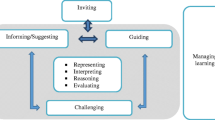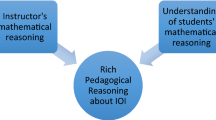Abstract
Prompted by recent moves in the United Kingdom to guide teachers’ practices in whole-class, direct interactive teaching, in this article, we offer an opportunity for North American mathematics educators to reflect on possibilities for whole-class teaching of mathematics. We focus particularly on the plenary aspect of lessons—what might be considered the debriefing of mathematical activity—and specifically on the teacher’s responsibility during those sessions, both to his or her students and to the authenticity of the discipline of mathematics. Drawing on data from a Grade-3 classroom and invoking complexity science as a theoretical lens to explore the classroom as a complex learning system, we present implications for teaching in whole-class debriefings of mathematical activity.
Résumé
Dans cet article, en réaction à de récents développements en Grande Bretagne visant à guider la pratique de l’enseignement direct et interactif dans des classes nombreuses, nous souhaitons offrir aux enseignants des mathématiques en Amérique du Nord ‘l’occasion de réfléchir sur les possibilités que représente l’enseignement des mathématiques à des classes pleines. Nous centrons surtout notre attention sur les aspects ‘pléniers’ des leçons — ce que nous pourrions qualifier de débriefing des activités mathématiques — et surtout sur la responsabilité des enseignants au cours de ces sessions, en particulier envers les étudiants et envers l’authenticité qui caractérise la discipline des mathématiques. Notre argumentation se fonde sur des données provenant d’une classe de troisième année, et nous nous servons de la complexité des sciences comme lunette théorique permettant d’explorer la salle de classe comme système complexe d’apprentissage. Nous présentons ensuite certaines implications pour l’enseignement dans le cadre de débriefings de classe pour ce qui est des activités mathématiques.
Similar content being viewed by others
References
Bauersfeld, H. (1988). Interaction, construction and knowledge: Alternative perspectives for mathematics education. In D. Grouws & T. Cooney (Eds.), Perspectives on research on effective mathematics teaching: Research agenda for mathematics education (Vol. 1, pp. 27–46). Reston, VA: National Council of Teachers of Mathematics / Lawrence Erlbaum.
Capra, F. (2002). The hidden connections: Integrating the biological, cognitive, and social dimensions of life into a science of sustainability. New York: Doubleday.
Chuska, K. (1995). Improving classroom questions. Bloomington, IN: Phi Delta Kappa.
Cobb, P., Yackel, E., & Wood, T. (1992). Interaction and learning in mathematics classroom situations. Educational Studies in Mathematics, 23, 99–122.
Cockcroft, W.H. (1982). Mathematics counts: Report of the Committee of Inquiry into the Teaching of Mathematics in Schools. London: HMSO.
Davis, B. (1996). Teaching mathematics: Toward a sound alternative. New York: Garland.
Davis, B., & Simmt, E. (2002). The complexity sciences and the teaching of mathematics. In D. Mewborn, P. Sztajn, D. White, H. Wiegel, R. Bryant, & K. Nooney (Eds.), Proceedings of the twenty-fourth annual meeting of the North American Chapter of the International Group for the Psychology of Mathematics Education (Vol. 2, pp. 831–840). Columbus, OH: ERIC Clearinghouse for Science, Mathematics, and Environmental Education. (SE 066 888)
Davis, B., & Simmt, E. (2003). Understanding learning systems: Mathematics education and complexity science. Journal for Research in Mathematics Education, 34(2), 137–167.
Dillon, J. (1987). The multidisciplinar world of questioning. In W. Wilen (Ed.), Questions, questioning techniques and effective teaching (pp. 49–66). Washington, DC: National Education Association.
Dillon, J. (1988). Questioning and teaching: A manual of practice. New York: Teachers College Press.
English, E., Hargreaves, L., & Hislam, J. (2002). Pedagogical dilemmas in the National Literacy Strategy: Primary teachers’ perceptions, reflections and classroom behaviour. Cambridge Journal of Education, 32(1), 9–26.
Goos, M. (2004). Learning mathematics in a classroom community of inquiry. Journal for Research in Mathematics Education, 35(4), 258–291.
Hardman, F., Smith, F., & Wall, K. (2003). ‘Interactive whole class teaching’ in the National Literacy Strategy. Cambridge Journal of Education, 33(2), 197–215.
Hoyles, C. (1985). What is the point of group discussion in mathematics? Educational Studies in Mathematics, 16, 205–214.
Hufferd-Ackles, K., Fuson, K., & Sherin, M.G. (2004). Describing levels and components of a math-talk learning community. Journal for Research in Mathematics Education, 35(2), 81–116.
Johnson, S. (2001). Emergence: The connected lives of ants, brains, cities, and software. New York: Scribner.
Jones, S., & Tanner, H. (2002). Teachers’ interpretations of effective whole-class interactive teaching in secondary mathematics classrooms. Educational Studies, 28(3), 265–274.
Kieran, C. (2001). The mathematical discourse of 13-year-old partnered problem solving and its relation to the mathematics that emerges. Educational Studies in Mathematics, 46(1-3), 187–228.
Lampert, M., Rittenhouse, P., & Crumbaugh, C. (1996). Agreeing to disagree: Developing sociable mathematical discourse. In D. Olson & N. Torrance (Eds.), The handbook of education and human development: New models of learning, teaching, and schooling (pp. 731–764). Cambridge, MA: Blackwell.
Linchevski, L., & Kutscher, B. (1998). Tell me with whom you’re learning, and I’ll tell you how much you’ve learned: Mixed-ability versus same-ability grouping in mathematics. Journal for Research in Mathematics Education, 29(5), 533–554.
Martin, L.C., Towers, J., & Pirie, S.E.B. (2006). Collective mathematical understanding as improvisation. Mathematical Thinking and Learning, 8(2), 149–183.
McClain, K., & Cobb, P. (2001). An analysis of development of sociomathematical norms in one first-grade classroom. Journal for Research in Mathematics Education, 32(3), 236–266.
Nathan, M., & Knuth, E. (2003). A study of whole classroom mathematical discourse and teacher change. Cognition and Instruction, 21(2), 175–207.
National Council of Teachers of Mathematics. (1989). Curriculum and evaluation standards for school mathematics. Reston, VA: Author.
Pirie, S., & Schwarzenberger, R. (1988). Mathematical discussion and mathematical understanding. Educational Studies in Mathematics, 19, 459–470.
Postman, N., & Weingartner, C. (1969). Teaching as a subversive activity. New York: Delacorte Press.
Sigurdson, S., & Olson, A. (1992). Teaching mathematics with meaning. Journal of Mathematical Behavior, 11(1), 37–57.
Simmt, E., Gordon Calvert, L., & Towers, J. (2002). Explanations offered in community: Some implications. In D. Mewborn, P. Sztajn, D. White, H. Wiegel, R. Bryant, & K. Nooney (Eds.), Proceedings of the twenty-fourth annual meeting of the North American Chapter of the International Group for the Psychology of Mathematics Education, (Vol. 2, pp. 979–989). Columbus, OH: Eric Clearinghouse for Science, Mathematics, and Environmental Education. (SE 066 888)
Simmt, E., & Kieren, T. (2001, April), Enactive listening: Characteristics and consequences. Paper presented at the annual meeting of the American Educational Research Association. Seattle, Washington.
Sinclair, M. (2003). Some implications of the results of a case study for the design of pre-constructed dynamic geometry sketches and accompanying materials. Educational Studies in Mathematics, 52(3), 289–317.
Sinclair, J., & Coulthard, M. (1975). Towards an analysis of discourse: The English used by teachers and pupils. London: Oxford University Press.
Tharp, R.G., & Gallimore, R. (1988). Rousing minds to life: Teaching, learning, and schooling in social context. Cambridge, UK: Cambridge University Press.
Thorn, J., & Pirie, S. (2002). Problems, perseverance and mathematical residue. Educational Studies in Mathematics, 50(1), 1–28.
Towers, J. (1998). Telling tales. Journal of Curriculum Theorizing, 14(3), 29–35.
Towers, J. (2003a, November). Understanding area: Ways of knowing. Paper presented at the National Council of Teachers of Mathematics Regional Conference. Edmonton, AB.
Towers, J. (2003b). Exploring the fragility and robustness of students’ mathematical understanding. In E. Simmt & B. Davis (Eds.), Proceedings of the twenty-seventh annual meeting of the Canadian Mathematics Education Study Group/ Groupe Canadien d’Etude en Didactique des Mathématique (pp. 103–109). Edmonton, AB.
Towers, J., & Davis, B. (2002). Structuring occasions. Educational Studies in Mathematics, 49(3), 313–340.
Towers, J., & Hunter, K. (2006). An ecological reading of mathematical language in a Grade 3 classroom: A case of learning and teaching measurement estimation. Manuscript submitted for publication.
Towers, J., Martin, L., & Pirie, S. (2000, May). Layering observations of growing mathematical understanding. Paper presented at the annual meeting of the Canadian Society for the Study of Education. Edmonton, AB.
UK Department for Education and Skills. (2001). Key stage 3 national strategy: Framework for teaching mathematics—Years 7, 8 and 9. Cambridge, UK: Cambridge University Press.
Voigt, J. (1995). Thematic patterns of interaction and sociomathematical norms. In P. Cobb & H. Bauersfeld (Eds.), The emergence of mathematical meaning: Interaction in classroom cultures (pp. 163–201). Hillsdale, NJ: Lawrence Erlbaum.
Wilkinson, L.C. (1985). Communication in all-student mathematics groups. Theory into Practice, 24(1), 8–13.
Wood, T. (1990). The development of mathematical discussion. In G. Booker, P. Cobb, & T. de Mendicuti (Eds.), Proceedings of the fourteenth annual meeting of the International Group for the Psychology of Mathematics Education (Vol. 3, pp. 147–153). Mexico City, Mexico.
Yackel, E. (2002). What we can learn from analysing the teacher’s role in collective argumentation. Journal of Mathematical Behavior, 21, 423–440.
Yackel, E., & Cobb, P. (1996). Sociomathematical norms, argumentation, and autonomy in mathematics. Journal for Research in Mathematics Education, 27(4), 458–477.
Yackel, E., Rasmussen, C., & King, K. (2001). Social and sociomathematical norms in an advanced undergraduate mathematics course. Journal of Mathematical Behavior, 19, 1–13.
Zazkis, R. (1998). Odds and ends of odds and evens: An inquiry into students’ understanding of even and odd numbers. Educational Studies in Mathematics, 36(1), 73–89.
Author information
Authors and Affiliations
Rights and permissions
About this article
Cite this article
Towers, J., Simmt, E. The Teacher’s Responsibility in Whole-Class Debriefing of Mathematical Activity. Can J Sci Math Techn 7, 231–255 (2007). https://doi.org/10.1080/14926150709556728
Published:
Issue Date:
DOI: https://doi.org/10.1080/14926150709556728




